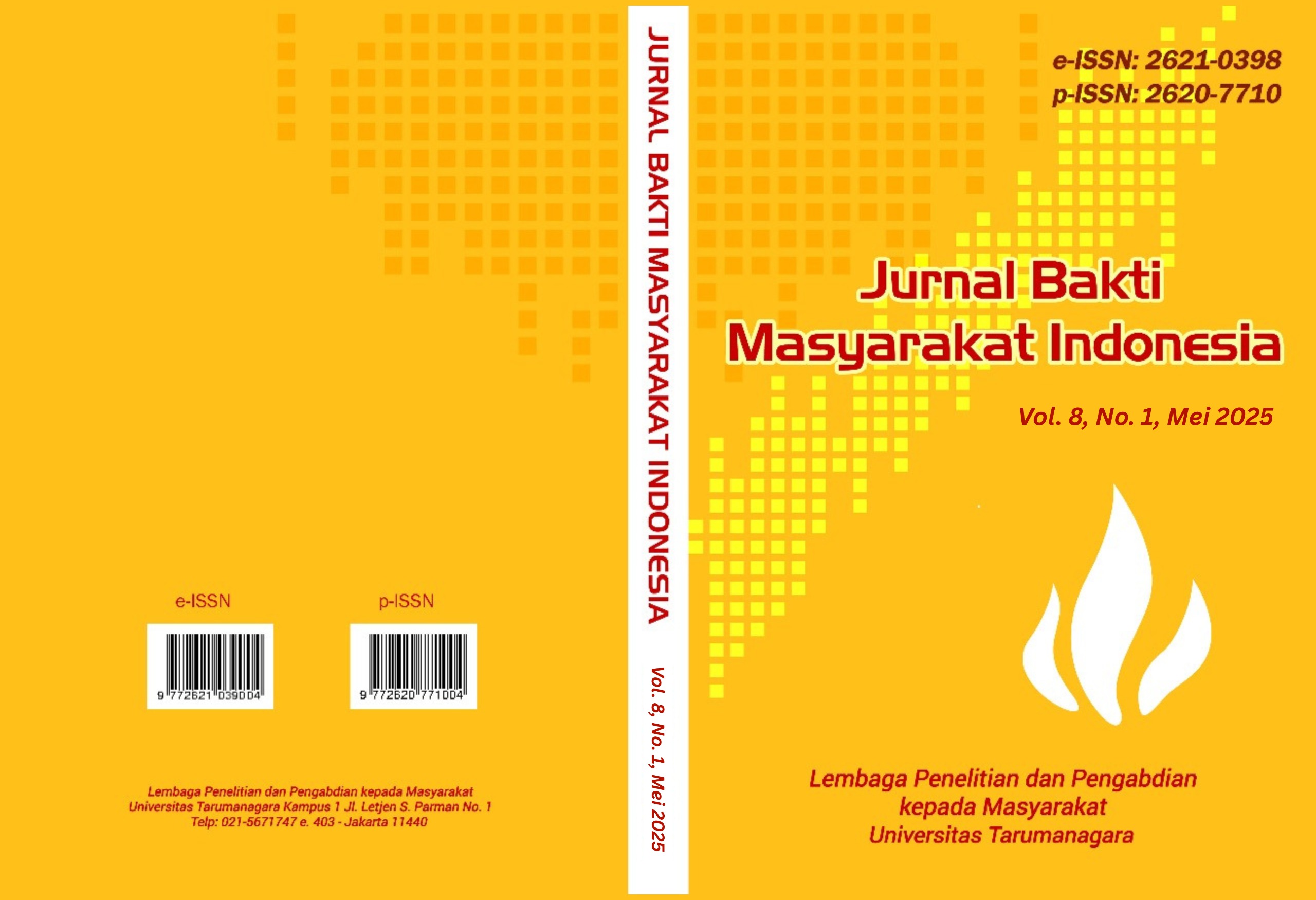GAYA HIDUP BERKELANJUTAN SOSIALISASI DAN PRAKTEK DI RA TAUFIQURRAHMAN, BEJI TIMUR DEPOK
Main Article Content
Abstract
This activity aims to introduce a sustainable lifestyle to children in Raudhatul Athfal (RA) Taufiqurrahman, Beji Timur Village, Depok. Along with climate change, it causes shifts in seasons so that during the dry season there is drought. On the other hand, during the rainy season it causes flooding or puddles. This situation has a negative impact on health, so it is time for people to adopt a sustainable lifestyle to play a role in maintaining economic, social and environmental sustainability. Conceptually, this lifestyle is a manifestation of the circular economic development model to accelerate the achievement of the SDGs by 2030. Socialization is needed as a mechanism to enrich knowledge and get used to a sustainable lifestyle. Socialization material related to (1) reduce, reuse and recycle, (2) plastic diet, (3) consumption of local vegetables and fruits, (4) saving clean water, and (5) reducing vehicle use by walking. The solution criteria are: Children are involved in activities so they understand examples of sustainable lifestyles. This is done through recycling activities for school crafts and eating local fruit/vegetables which are widely grown or sold around Depok City, such as: bananas, papaya, mangoes and others. As an evaluation, students' daily habits were selected, namely: (1) shopping habits, (2) consumption or eating patterns, and (3) transportation. The target of the activity is that children can know and practice this lifestyle so that when they continue to elementary school level, they have already received this knowledge.
Article Details

This work is licensed under a Creative Commons Attribution-NonCommercial-ShareAlike 4.0 International License.
This work is licensed under a Jurnal Bakti Masyarakat Indonesia https://creativecommons.org/licenses/by-nc-sa/4.0/
References
Heshmati, A. (2015). A Review of the Circular Economy and its Implementation. International Journal of Green Economics, (Vol. 9611). Born. https://doi.org/10.1504/IJGE.2017.10010876
Lahti, T., Wincent, J., & Parida, V. (2018). A Definition and Theoretical Review of the Circular Economy, Value Creation, and Sustainable Business Models: Where Are We Now and Where Should Research Move in the Future? Sustainability, 10(8), 2799. https://doi.org/10.3390/su10082799
Mularsih, H., & Nuringsih, K. (2017). Motivasi Green Behavior: Kegiatan Bersama Pomg Raudhatul Athfal Taufiqurrahman Beji Timur Depok. Prosiding Senapenmas. (PDF) Motivasi Green Behavior: Kegiatan Bersama Pomg Raudhatul Athfal Taufiqurrahman Beji Timur Depok (researchgate.net).
Nuringsih, K., & Edalmen (2023). Sosialisasi Water Awareness Kepada Anak-Anak Di RA Taufiqurrahman Beji Timur Depok. Jurnal Serina Abdimas, Vol. 1, No. 2, Mei 2023: hlm 727-733
Nuringsih, K., & Nuryasman M.N. (2022). Understanding Relationship Green Entrepreneurship and Circular Economy. Jurnal Manajemen, Vol. XXVI, No. 02, June 2022: 200-224 DOI: http://dx.doi.org/10.24912/jm.v26i2.970
Nuringsih, K., Mularsih, H., & Edalmen. (2019). Encouraging Student’s Pro-Environmental Behavior in East Beji, Depok, MITRA: Jurnal Pemberdayaan Masyarakat, 3(1), May 21, 31-40
Nuringsih, K., Mularsih, H., & Haris, D.A. (2017). Pengenalan dan Implementasi Green Behavior Pada Taman Kanak-Kanak Di Beji Timur Depok. Prosiding Senapenmas. https://www.researchgate.net/publication/341820887_PENGENALAN_DAN_IMPLEMENTASI_GREEN_BEHAVIOR_PADA_TAMAN_KANAK-KANAK_DI_BEJI_TIMUR_DEPOK
Pla-Julián, I., & Guevara, S. (2019). Is Circular Economy the Key to Transitioning Towards Sustainable Development? Challenges from The Perspective of Care Ethics. Futures, 105, 67–77. https://doi.org/10.1016/j.futures.2018.09.001



